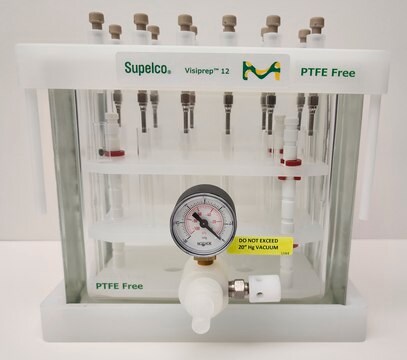57192-U
PlatePrep 96-well Vacuum Manifold
Manifold only
Synonym(s):
96-well SPE plate vacuum manifold
About This Item
Recommended Products
material
polypropylene tube
technique(s)
solid phase extraction (SPE): suitable
application(s)
food and beverages
Looking for similar products? Visit Product Comparison Guide
General description
Use this compact vacuum manifold in conjunction with a Discovery SPE 96-well plate to process up to 96 samples concurrently. The single valve control, parallel processing capabilities, and uniform flow dynamics allow for easier method development, reduce clutter, and improve reproducibility. Unused wells can be covered and used at a later date.
A PlatePrep 96-Well Starter Kit (Cat. No. 575650-U) is available to anaysts new to 96-well SPE technology. Included with the Starter Kit is PlatePrep Vacuum Manifold and sample units of key accessory items necessary for 96-well SPE.
Application
- Quantitation of Trastuzumab and an Antibody to SARS-CoV-2 in Minutes Using Affinity Membranes in 96-Well Plates.: Demonstrating the efficiency of 96-well plates with vacuum manifolds in rapid immunological assays, this study highlights a method to quickly quantify antibodies, crucial for responsive disease management and treatment verification in clinical and research settings (Tan et al., 2022).
- High-Throughput Flow-Through Direct Immunoassays for Targeted Bacteria Detection.: This research utilizes 96-well plate formats to enhance the throughput and sensitivity of bacterial detection assays. The integration of vacuum manifolds streamlines sample processing, which is vital for environmental monitoring and clinical diagnostics (Chorti et al., 2021).
- Sample Preparation for High-Throughput Urine Proteomics Using 96-Well Polyvinylidene Fluoride (PVDF) Membranes.: Exploring the capabilities of 96-well plates in proteomics, this study outlines methods for preparing urine samples for mass spectrometry, aiming to standardize high-throughput proteomic analyses, which are essential for biomarker discovery and disease diagnostics (Ahmed et al., 2021).
- MStern Blotting-High Throughput Polyvinylidene Fluoride (PVDF) Membrane-Based Proteomic Sample Preparation for 96-Well Plates.: Addressing the challenges in proteomic sample preparation, this study presents a novel method that uses 96-well plates to enhance the efficiency and reproducibility of protein analyses, crucial for biochemical research and therapeutic development (Berger et al., 2015).
- Semiautomated Sample Preparation for Protein Stability and Formulation Screening via Buffer Exchange.: This article showcases the use of 96-well vacuum manifolds in streamlining the buffer exchange process in protein formulation studies, a critical step in pharmaceutical development to ensure the stability and efficacy of therapeutic proteins (Ying et al., 2016).
related product
Choose from one of the most recent versions:
Certificates of Analysis (COA)
Sorry, we don't have COAs for this product available online at this time.
If you need assistance, please contact Customer Support.
Already Own This Product?
Find documentation for the products that you have recently purchased in the Document Library.
Articles
This Sigma-Aldrich article discusses how the HybridSPE-Phospholipid Technology works and how the phospholipids are removed.
Novel sample prep technique coupled with the unique selectivity of the Ascentis Express F5 column enables a fast and simplified bioanalytical method for associated vitamin D metabolites.
Using HybridSPE-Phospholipid, Ascentis Express, and Other LC-MS Workflow Components
Protocols
The conversion of clinical methods to LC/MS/MS offers advantages; however, is accompanied by a few limitations, notably interference effects from the endogenous sample matrix.
The conversion of clinical methods to LC/MS/MS offers advantages; however, is accompanied by a few limitations, notably interference effects from the endogenous sample matrix.
The conversion of clinical methods to LC/MS/MS offers advantages; however, is accompanied by a few limitations, notably interference effects from the endogenous sample matrix.
The conversion of clinical methods to LC/MS/MS offers advantages; however, is accompanied by a few limitations, notably interference effects from the endogenous sample matrix.
Our team of scientists has experience in all areas of research including Life Science, Material Science, Chemical Synthesis, Chromatography, Analytical and many others.
Contact Technical Service







